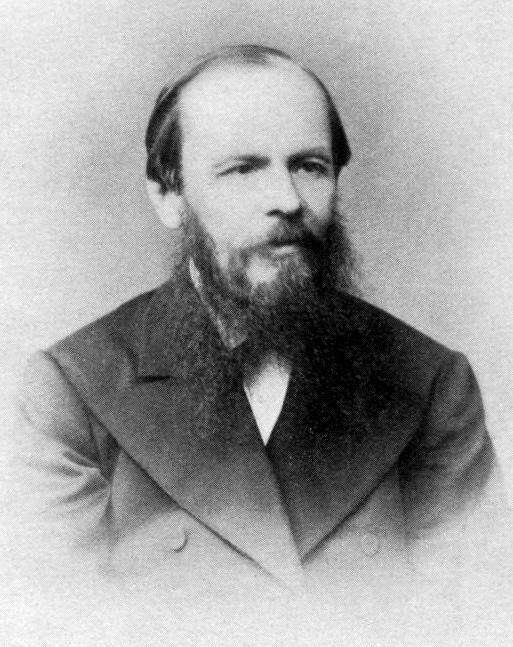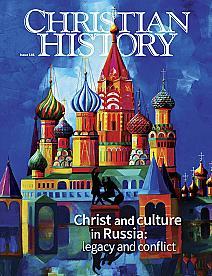MURDER, GUILT, UNJUST IMPRISONMENT, AND FAITH FORMED DOSTOEVSKY’S WRITINGS

[Above: Fyodor Dostoyevsky in 1876 from Letters to Friends and Family, Chatto Windus 1914—H. Doss / public domain, Wikimedia File:Fyodor Mikhailovich Dostoyevsky 1876.jpg]
IN 1839, when Fyodor Dostoevsky was eighteen, Russian serfs murdered his father, Mikhail. While unexpected, the homicide was not a random crime. Mikhail, an Orthodox Christian and medical doctor, was a harsh and unsympathetic figure who often vented anger and sarcasm at his children and underlings. Apparently serfs reacted violently to one such outburst. No one ever was prosecuted for the crime. Considering the shock his father’s death gave Dostoevsky, it is not surprisingly that his writings explore murder and guilt, and true and false religion—or that he aligned himself against serfdom.
Dostoevsky completed his first novel, Poor Folk, in 1845. About then he became interested in utopian schemes and formed connections with socialist intellectuals. In 1847, he joined a group that criticized serfdom and governmental censorship. Denounced to the Ministry of Internal Affairs, Dostoevsky and his friends were arrested on this day, 23 April 1849. To criticize church or czar was considered revolutionary. After spending months in prison, Dostoevsky was sentenced to death. At the last moment, while the prisoners actually stood before a firing squad, a messenger appeared with a reprieve from the czar. The execution turned out to be a cruel hoax, staged for maximum effect. Because of that experience, Dostoevsky’s writings would sometimes detail the last thoughts of dying men.
Instead of death, Dostoevsky was condemned to four years in a Siberian penal camp. As he was leaving Saint Petersburg in leg irons, three women handed him a Gospel. He kept this under his pillow in prison and read it over and over, underlining passages that focused on persecution of the just and of coming judgment. Living among Russia’s most depraved convicts and subject to the whims of sadistic guards, he lost his illusions about the inherent goodness of mankind. He fictionalized some of the horrors he witnessed in another novel, House of the Dead, and developed the theme of forgiving those who wrong us. (His later quarrels with and estrangement from fellow writers show he found this advice easier to give than to follow.)
Six years of exile at a military post followed his imprisonment. When he returned to society, his writings reveal the deepening impact of years of suffering. In his great novels Crime and Punishment, The Idiot, Demons, and The Brothers Karamazov, protagonists wrestle with conscience and with Christian ideals. Nihilism is deplored for its emptiness. The slanderous lying and double-dealing of revolutionaries are ruthlessly exposed. The human condition is laid bare. In the background of his novels, often indistinct, are Christ and the cross. In Christianity Dostoevsky saw the hope for Russian salvation and therefore had no use for atheism which he thought would destroy the spirit of the peasants.
Dostoevsky suffered from epilepsy and he struggled with gambling and impulsive behaviors. These made life hard for him and his wife, Anna. However, in 1871, following serious losses at the gaming tables, Dostoevsky underwent a shift of perspective, connected with two terrifying dreams, and never again gambled. Although his new self-control made his final years financially easier, another blow struck. He and Anna lost their beloved son Alyosha. Dostoevsky sought comfort and counsel from Ambrose of Optina, a famous Russian Starets (spiritual advisor).
While Dostoevsky did not distinctly claim Christ as his personal savior in his writings, he turned to Jesus’s words again and again during his many troubles. He rejoiced that as a child his parents brought him up knowing the Bible stories. As he was dying in 1881, he had Anna read his favorite Gospel passages to him. His epitaph is from John 12:24: “Unless a grain of wheat falls to the earth and dies, it remains by itself alone; but if it dies, it bears much fruit.”
—Dan Graves
----- ----- -----
For more on the culture Dostoevsky inherited and enhanced, read Christian History #146, Christ and Culture in Russia






